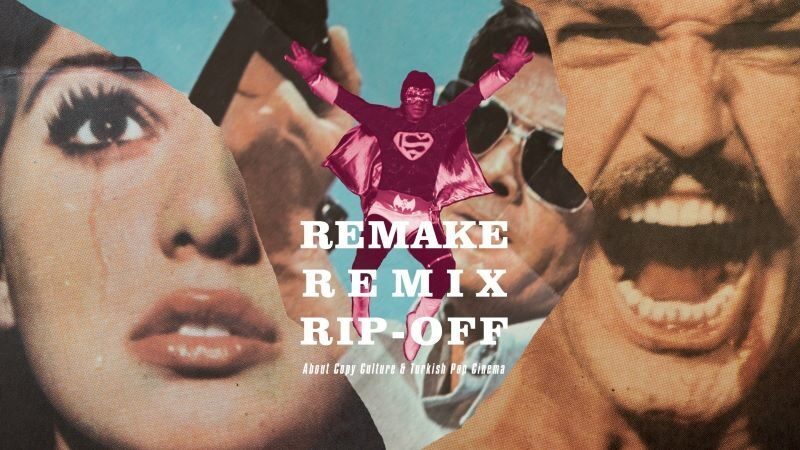Remake, Remix, Rip-Off: The Explosion of Turkish Copycat Cinema
Review of Remake, Remix, Rip-Off at SIFF
Written by TeenTix Newsroom Writer Rose Shipley and edited by Teen Editor Joshua Fernandes.

Showing as part of the Seattle Turkish International Film Festival, Remake, Remix, Rip-Off, directed by Cem Kaya, dives into the Turkish filmmaking world of the 60s and 70s. Focuses the haphazard way the industry was run, in order to keep up with the high paced demand of the Turkish viewing audiences.
Interview clips are quickly intercut between archival footage from low budget, fairly cheesy Turkish films with adept comedic timing. In the famous Turkish movie theater Emek, over 10,000 people would attend screenings of these style of movies in one day. With audiences constantly demanding more movies, and the extremely limited budgets of many of these films, the Turkish film industry was characterized by necessary creativity. Writers would create screenplays by taking the ending from one story and pasting it onto the beginning of another, sometimes even copying the plots of famous American movies. Like Rampage, a Rambo rip-off. At one point, the documentary follows a Turkish film maker as he shows off his collection of iconic American movie soundtracks on vinyl, and describes how these soundtracks were used to score all kinds of Turkish films. Like how the Jaws 2 soundtrack was for scary movies. This plagiarism thrived because Turkey’s laws on copyright were far looser than international copyright law. Throughout the movie we see directors laugh about how they would take stories directly from American movies and boast how they were able to work on over thousands of films in their career. In Hollywood it would be physically impossible to work on that many movies, but it could be achieved through the unique environment of Turkey’s film industry, where speed in creating productions was valued over originality.
The documentary generally feels lighthearted and nostalgic, with the interviews invoking the feeling of old friends gathering around to reminisce about the crazy antics they used to get up to. However, the film does shift its tone to address how changes in the Turkish political climate impacted the film industry. As governments changed and grew much more authoritarian over a series of three army interventions in 20 years, censorship drove people out of the industry and changed how the movies had to be made. This censorship was specifically targeted at anything that could be perceived as propaganda against the state. Pornographic movies flourished during this time despite this censorship because their content wasn’t perceived as propaganda against the state. This censorship still affects the Turkish film industry today. Turkish film industry members are currently protesting grueling working conditions and the demolition of iconic cultural film centers as the Turkish film industry fades from prominence.
I went into this movie with no knowledge whatsoever about the history of the Turkish cinema, and if I hadn't seen this movie I think I may have never learned about this fascinating section of film history. Despite touching on morbid topics like government censorship and worker mistreatment, the film maintains a humorous, yet never insensitive, tone throughout. The anecdotes from the interviewees about the trials and tribulations of low-budget film-making, combined with archival footage from old cheesy Turkish movies kept the audience laughing. The highlight of the film for me was the quick paced editing of the archival footage sliced between interviews, it really kept the film engaging. While the fast cutting made the movie interesting it it also shifted between scenes and speakers so quickly at times it could be dizzying to follow. It gave the film an engaging speed, and avoided one of the frequent pitfalls of documentaries, painfully long shots of someone simply sitting in a chair talking. While I never lost interest when watching the film, I found it hard to follow the movie’s frequently changing focus, which had no clearly identifiable narrative arch. It jumped around from anecdote to anecdote, and it was unclear at times how these stories were related. This became clear to me when I noticed how hard it was to keep track of who was talking. With quick cuts, constantly rotating interviewees, and a new interviewee being introduced every two minutes, all the people talking begin to blur together. Despite the chaotic nature of the film’s structure and editing, I would recommend watching this film, although because of the clips from the old Turkish movies have so many different copyright infringements it is basically impossible to watch Remake, Remix, Rip-Off online. It's an engaging dive into the machine that was the Turkish Movie Industry, and even if it doesn’t become your favorite movie, you’ll laugh and learn something new.
Lead photo credit: Remake, Remix, Rip-Off film poster.
The TeenTix Newsroom is a group of teen writers led by the Teen Editorial Staff. For each review, Newsroom writers work individually with a teen editor to polish their writing for publication. The Teen Editorial Staff is made up of 6 teens who curate the review portion of the TeenTix blog. More information about the Teen Editorial Staff can be found HERE.
The TeenTix Press Corps promotes critical thinking, communication, and information literacy through criticism and journalism practice for teens. For more information about the Press Corps program see HERE.


